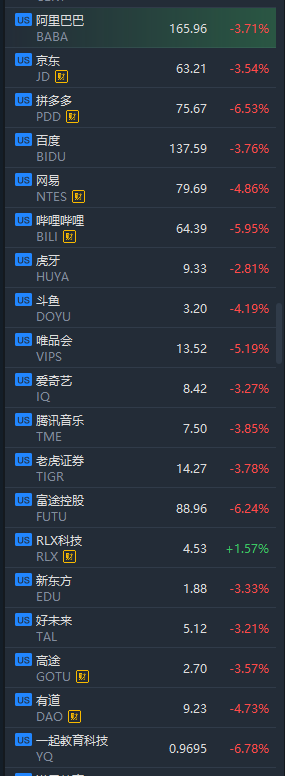(Aug 19) Stocks open lower as investors assess Fed taper timetable, rising COVID cases.
Dow industrials down 235 points, or 0.7%, at 34,726. S&P 500 down 0.6% at 4,372.80. Nasdaq Composite off 0.5% at 14,455.11.
China concepts stocks sink. Chinese technology stocks sold off, led by some of the country’s Internet giants, after two government ministries said they were likely to impose additional regulations on the sector.

Stock markets have hit turbulence this week after eking out a series of record highs. Investors broadly remain upbeat about the outlook for share prices, given the rapid pace of earnings growth. But some have grown more cautious, concerned that rising coronavirus cases in the U.S. and elsewhere will dent the global economic recovery at the same time as the Fed is gearing up to rein in its huge bond-buying program.
“These things are going to cause market volatility,” said Caroline Simmons, U.K chief investment officer at UBS Global Wealth Management. “People are trying to work out what [the Delta variant] is going to mean: does it mean more lockdowns, is it going to damage growth?”
Commodity producers lost ground ahead of the bell in New York as energy and material prices retreated.Devon Energy,miner Freeport-McMoRan and Occidental Petroleum all fell 3% or more in premarket trading.
A bright spot came fromBath & Body Works,which rose almost 5% after the retailer, formerly known as L Brands, beat analysts’ earnings expectations for the second quarter.Nvidiaadded 1.6% after the graphics-chip maker posted record quarterly profits and sales.
Broadly, though, investors moved out of assets that are particularly sensitive to the global economic recovery, and into those seen as more sheltered. The dollar, viewed as a haven by money managers, strengthened, pushing the ICE Dollar Index up 0.3% to its highest level since November.
Government bonds rallied, pushing down yields. The yield on 10-year Treasury notes slid to 1.242% from 1.273% Wednesday. Yields fall when bond prices rise.
In another sign of jitters among investors, the Cboe Volatility Index, a gauge of expected swings in the stock market, rose to 23.69. That marked its highest level since May.
Minutes of the Fed’s July meeting, published Wednesday, revealed an emerging consensus to scale back $120 billion in monthly asset purchases this year. The minutes said several officials favored reducing asset purchases in the coming months to position the Fed to potentially raise interest rates if the economy strengthens further next year.


